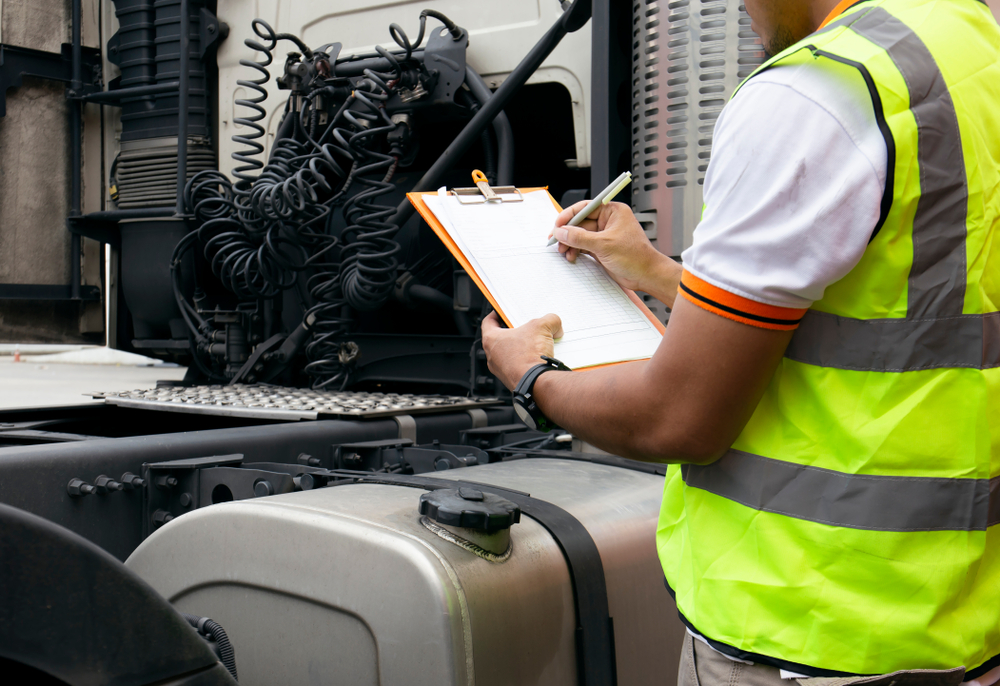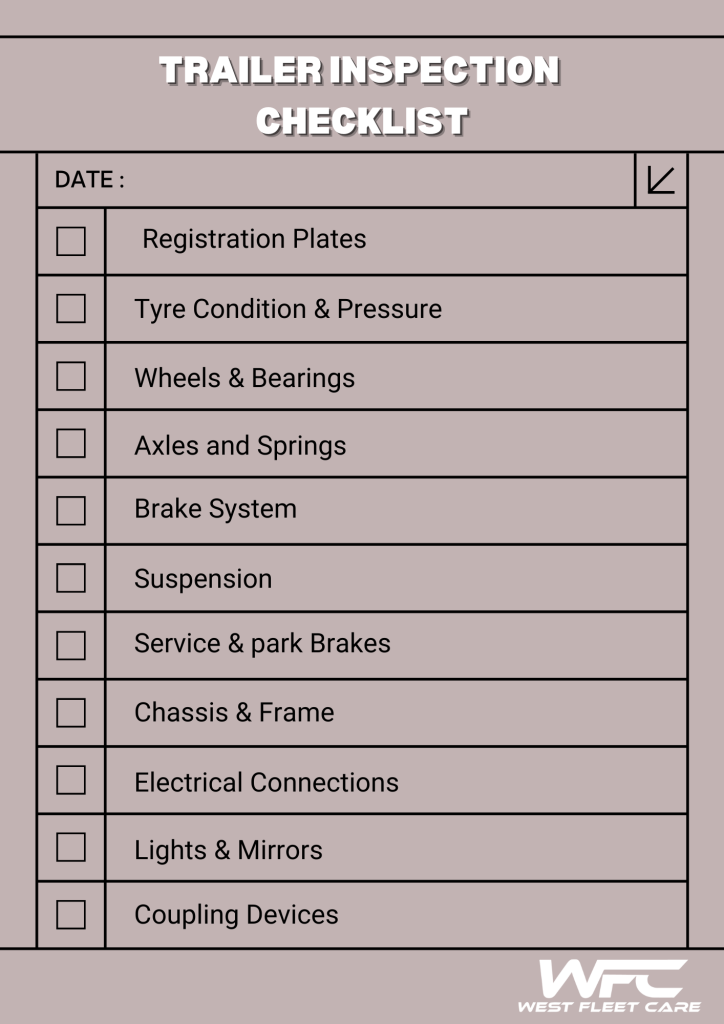Roadworthy Trailer Inspections in Perth: A Complete Guide

Your trailer works hard – hauling tools, transporting goods, & towing your boat for a weekend escape. But just like any vehicle, it needs regular checks & maintenance.
Because the last thing you want is to realise on the road that your lights aren’t functional. Your tyres are worn out. Or your brakes are taking longer to work.
In Perth, trailers must meet road safety standards to stay legally compliant. Failed trailer inspections in Perth mean downtime, extra repair costs, and legal trouble.
At West Fleet Care, we offer you professional and reliable vehicle maintenance services. Our skilled mechanics keep your trailer worthy of road safety standards. Helping you avoid any unexpected issues down the line.
Don’t know the essentials of a trailer inspection checklist? No worries! We’ve put together a guide to vehicle inspections. So, you can pass your next one with ease.
Let’s start.
How to Prepare for a Trailer Inspection?
Preparation is essential for a smooth inspection process. The more you plan, the less likely you’ll encounter issues during the check.
Here’s a step-by-step guide to getting your trailer inspection-ready.
1. Inspect the Essential Parts
Before heading for an official inspection. Conduct your own check of your trailer’s critical components. This can help you catch and fix issues before an inspector does.
Component | Inspection Details |
Tyres | Look for worn-out tread, cracks, or punctures. |
Lights & Wiring | Make sure all electrical connections are functioning. |
Brakes & Suspension | Test your brakes that they respond properly or not. |
Hitch & Coupler | Check the fastening & wear of your towing system. |
If you find anything that needs fixing. It’s best to get it repaired before your official inspection.
2. Gather Necessary Documents
Nothing is more frustrating than arriving at an inspection without the right papers. Make sure you have:
- Your vehicle license papers
- Proof of ownership of the trailer
- Proof of identity and residency in WA
- Temporary Movement Permit (for unlicenced trailers)
Keeping everything in order speeds up the process and prevents unnecessary delays.
3. Address Any Outstanding Issues
If you’ve been postponing minor repairs or maintenance tasks. Now is the time to get them sorted.
- If your lights flicker, check the wiring and fuses.
- If your brakes feel weak, get them serviced immediately.
- If your tyres are wearing unevenly, get your suspension and wheel alignment checked.
Small issues like a broken reflector or a low brake fluid level seem insignificant. But can lead to a failed inspection.
4. Keep a Weighbridge Certificate Handy
If the tare weight (unladen weight) of your trailer isn’t recorded. You will need a weighbridge certificate. It helps verify that your trailer meets weight regulations and can handle the required load capacity.
If you are unsure whether you need it or don’t know where to get it. Discuss with an expert to get the best advice.
5. Give Your Trailer a Good Clean
A clean trailer not only makes a better impression. But also makes it easier for the inspector to examine all components properly.
- Clean any dirt, rust, or debris
- Remove your personal belongings
- Wipe the lights and reflectors
Your trailer is now ready to pass the inspection check.
Detailed Trailer Inspection Checklist WA
While conducting a trailer inspection, you will be asked to fill out some basic details like:
- Registration number
- Reason for inspection
- Make/Model
- Body Type
- Colour of body
Then a licensed inspector will check the key components of your trailer for roadworthy standards. Here’s a comprehensive trailer inspection checklist to help you prepare.

1. Documentation Check
Before checking the trailer itself, inspectors will verify your paperwork. Make sure you have:
- Registration details
- Vehicle identification number (VIN)
- Previous inspection reports (if applicable)
They will also check the registration plate for proper condition & visibility.
2. Tyre Condition & Pressure
Tyres play the most essential role in road safety. Inspectors will check:
- Tread depth (must be above the legal minimum of 1.5mm)
- Signs of cracking, bulging, or excessive wear
- Tyre pressure and inflation levels
3. Wheels & Bearings
Faulty wheels or bearings can lead to dangerous failures. Key checks include:
- No missing, loose, or damaged wheel nuts
- Bearings are well-lubricated and not worn out
- No excessive play or wobbling in the wheels
4. Axles & Springs
A damaged axle or weak springs can lead to poor weight distribution and an unstable ride. Inspectors will look for:
- Cracks, rust, or visible damage
- Bent or misaligned axles
- Broken or worn-out springs
- Loosened mounting bolts
5. Brakes System
Trailers over a certain weight require functional brakes. The inspection will include:
- Brake pad wear levels
- Hydraulic brake fluid levels (if applicable)
- Responsiveness of braking mechanisms
6. Suspension Components
A worn-out suspension affects handling and stability. Inspectors will check:
- Condition of shock absorbers and springs
- Proper attachment of suspension components
- Leaks in air suspension (if applicable)
7. Chassis & Frame
The trailer’s structural integrity is key for safety. Checks include:
- Cracks, rust, or weak spots in the chassis
- Securely mounted crossbars
- Properly fastened load support structures
8. Wiring & Electrical Connections
A faulty electrical system can cause lighting failures and safety hazards on road. Inspectors will verify:
- No loose, corroded, or damaged wiring
- Secure connections to the towing vehicle
- Functional braking and indicator lights
9. Lighting System
Visibility is critical, especially at night, and it is not possible without functional lightening system. Make sure:
- Headlights, brake lights, and indicators work properly
- Reflectors are clean and in good condition
- Licence plate lights are functional
10. Hitch & Coupler
The towing connection must be secure and reliable. Inspectors will check:
- The hitch isn’t worn out or loose
- The safety chains are in good condition
- The coupler locks and secures properly
Keep all these components in tip-top shape and pass your trailer inspection WA like a pro. Let’s discuss how beneficial it is for your trailer.
Why You Shouldn’t Skip Regular Roadworthy Inspections?
There are several benefits of conducting your trailer’s regular inspections. Some important ones are given below.
Factor | Importance |
Safety | A well-maintained trailer reduces the risk of accidents. |
Legal Compliance | You can avoid hefty fines when your trailer meets WA’s roadworthy standards. |
Cost Savings | Regular maintenance prevents costly repairs down the line. |
Better Performance | A properly maintained trailer tows more smoothly and efficiently. |
Need more guidance about the process? Read on.
Pro Tips for Trailer Inspections | Make Process Smooth
Want to pass your trailer inspections in Perth on the first try? Keep these expert tips in mind:
- Schedule regular maintenance rather than waiting for things to break.
- Do a pre-inspection check before the official one.
- Keep your trailer clean to make the inspector’s job easier.
- Fix minor issues early to prevent expensive failures later.
- Stay updated on WA regulations to ensure compliance.
Need to get a vehicle inspected?
Get Reliable Trailer Inspections in Perth with West Fleet Care
At West Fleet Care, we provide reliable and professional trailer inspection WA. That makes sure that your vehicle meets road safety standards.
Based in Wangara, Western Australia. We service all makes and models, with a particular focus on Scania vehicles. Our team only uses high-quality consumables and authentic spare parts straight from the manufacturer to give you the best results.
Whether you need a one-off check or full fleet maintenance, our skilled mechanics can get it done. Our commitment to quality service can keep your trailer safe & legally compliant on the road.
Book Your Roadworthy Inspection Now
Check Our Vehicle Maintenance Services
